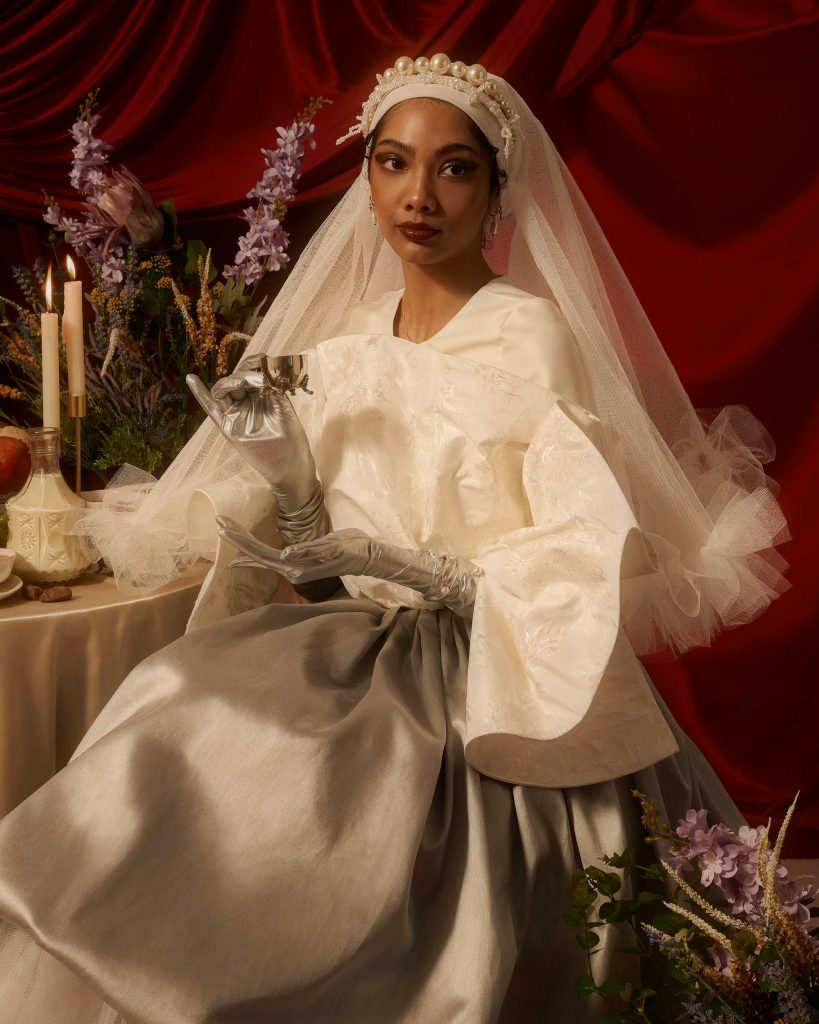
In May this year, graduates of the Fashion Design and Textiles programme at the School of Fashion at Lasalle College of the Arts presented a series of looks created in response to the theme, “Transition”, at the Graduate Fashion Show. GRAZIA Singapore speaks to three of them about their visions for the future of fashion—and how they aim to spearhead cultural change through their work. First up, Khairina Sari.
Fashion runs in Khairina Sari’s blood. “I grew up in a family of fashion,” she shares. “My grandmothers used to design baju kurungs for their friends and family, and my uncle was a fashion designer as well—he used to have a shop named Surip, near Orchard Road.”
When asked if she feels a responsibility to carry on the legacy, the 25‑year‑old gives an adamant no—her love for fashion has always been completely self‑motivated. “I’ve always liked fashion,” she says. “I like to dress up even when I’m going to a nearby place … My friends are always like, ‘Why did you dress up?’ [What they don’t get is that these are] just my normal clothes.”

While she cites hijab‑wearing Somali‑Norwegian model Rawdah Mohamed, a strong advocate for the rights of Muslim women worldwide, as a source of inspiration for her personal style—“As a Muslim modest wear influencer, she embraces her identity and proudly wears the hijab, even in countries where Muslims may face Islamophobia,” Khairina expounds—it was Malaysian singer Aina Abdul who spurred the realisation that modest dressing can be bold and self‑expressive.

Case in point? A feathered, neon green Daniel Zharif design she wore on an episode of Malaysian TV series Big Stage, where she is one of the judges. Aina’s sartorial sensibilities had influenced the young designer to believe that the sky’s the limit when it comes to modest dressing and to strive to shape a new vision for conservative wear here. “In Singapore, [modest wear] is not explored enough because the fabrics and patterns used are very safe. It’s always a generic long dress [made of] polyester, cotton or chiffon. It’s not as daring as I’d like it to be,” she confesses.
This adventurous spirit informed her graduate collection—aptly titled “Underneath the Veil”—which aims to “[uncover] and [redefine] what goes beyond the Muslim woman’s way of dress, particularly the hijab.” The line‑up sees the manipulation of basic veiling methods to create exaggerated versions of the hijabs we commonly see—think one featuring an oversized bow at the neck. The rest of the pieces are similarly theatrical, with dramatic collars and puff sleeves reminiscent of the Elizabethan era.

It was important to Khairina to push the limits of modest wear here—“I wanted to see how far modest dressing can go,” she says—so apart from form, she experimented with materials in her collection, introducing unconventional fabrics in substitute of the regular ones. Her veils, for example, are made of opaque fabrics such as duchess satin rather than chiffon—the material that veils available locally are typically made of. Because of the material’s translucency, chiffon veils need to be wrapped around the head and neck several times before they are opaque enough to be used (according to Islamic rules, hijabs should not be see‑through). Khairina’s use of opaque fabrics is thus as much a practical take as it is boldly exploratory.

Post-graduation, Khairina has her eye on filling the gap in the local modest bridal wear scene. “I really love bridal wear, but there aren’t many ready‑to‑wear options [when it comes to modest bridal wear] in Singapore,” the designer points out, adding that “such collections here are all only for rent”.
Though she is working commissions at the moment, Khairina hopes to one day have her own ready‑to‑wear label where she can fully realise her bold vision for modest dressing in Singapore. “Some don’t understand [my approach to modest wear] and they try to change it, but I know best how I want to push [my work] because I’m Muslim myself,” she says, demonstrating her resolve to persevere through whatever scepticism she might face from others both within and outside of the Muslim faith.
